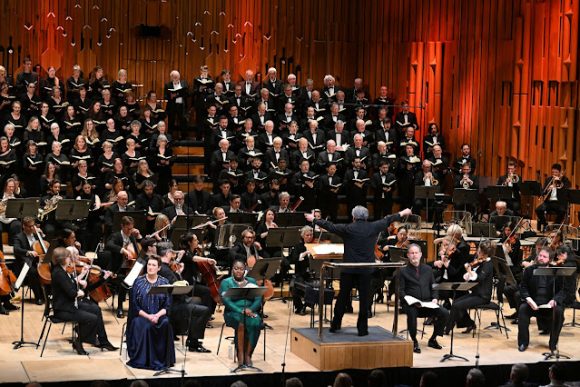 United Kingdom Mendelssohn, Elijah: Masabane Cecilia Rangwanasha (soprano), Dame Sarah Connolly (mezzo-soprano), Allan Clayton (tenor), Gerald Finlay (bass), London Symphony Chorus (chorus director: Mariana Rosa), The Guildhall Singers, London Symphony Orchestra / Sir Antonio Pappano (conductor). Barbican Hall, London. 28.1.2024. (JR)
United Kingdom Mendelssohn, Elijah: Masabane Cecilia Rangwanasha (soprano), Dame Sarah Connolly (mezzo-soprano), Allan Clayton (tenor), Gerald Finlay (bass), London Symphony Chorus (chorus director: Mariana Rosa), The Guildhall Singers, London Symphony Orchestra / Sir Antonio Pappano (conductor). Barbican Hall, London. 28.1.2024. (JR)

Elijah was commissioned by the Birmingham Festival in 1845: he was the go-to choice when an oratorio was needed, having nine years earlier established his credentials with the hugely popular St. Paul. Elijah proved even more popular: the reception at the festival was ecstatic and the audience called for several repeats of some of the highlights.
Set in Old Testament times (Mendelssohn was Jewish, though baptised), when the Kingdom of Israel took to worshipping the Canaanite deity Baal, Elijah describes the efforts of God’s prophet Elijah to restore the old religion, and his ultimate triumph as a messianic messenger.
The London Symphony Orchestra is effectively between Chief Conductors. Sir Simon Rattle has given his last concert in the Barbican Hall as outgoing Chief Conductor, Sir Antonio Pappano starts officially next season so we are in a sort of limbo: Pappano is Chief Conductor Designate. His already and apparent close rapport with members of the orchestra augurs very well for the future: we shall be intrigued to see what symphonic fare Pappano tackles first.
Elijah requires all the skills of an opera conductor, liaising with soloists, orchestra and chorus, often almost simultaneously. This is, of course, one of Pappano’s strengths and as a result, this was a performance of the very highest quality and one for the record books. Luckily, it was recorded for future broadcast on Marquee TV (from 22nd February) and for future general release on LSO Live.
Let me start with the soloists, only one of who needs a little more introduction than the others (household names). Masabane Cecilia Rangwanasha is a South African soprano who won the Song Prize at the BBC Cardiff Singer of the World Competition and is a former Jette Parker Young Artist of the Royal Opera House, Covent Garden. Rangwanasha is now in demand by leading opera houses; her star is rising very fast. Rangwanasha has a beautiful, strong, radiant, at times glittering voice, with crystal-clear top notes: her ‘Hear ye, O Israel’ was stunning. My only tiny quibble is a tendency, occasionally, to employ vibrato which is not appropriate for the work and one or two upward swoops. Rangwanasha has great stage presence, and we shall be seeing and hearing her a great deal in the years to come.
Dame Sarah Connolly is no stranger to our concert stages, and a National Treasure. Not only was she dressed perfectly for the part of Angel and Queen but her rich mezzo-soprano voice is also in fine fettle: Connolly exudes bloom and warmth.
Gerald Finley warmed up rather slowly to his part as the prophet Elijah and kept his voice protected to be ready for his many long and beautiful arias. Needless to say, they were all delivered exquisitely. ‘It is enough’ was full of pathos.
The soloist who stole the show, for me, was tenor Allan Clayton (a former Peter Grimes at Covent Garden). The vocal line fitted his voice to a T, a pity he did not have that much to sing, I just wanted him to go on and on.

The splendid and huge London Symphony Chorus were on form, impeccable dynamics very well controlled throughout, words clear, most entries exact. Soprano top notes were spot on, occasionally I would have liked more volume from the tenors. The choruses were rousing and taken fast. The descriptions of the chariots and the whirlwinds were most exciting and dramatic. The three calls to Baal displayed their fine graduated control of levels of fortissimo. The Guildhall Singers, a group of eight vocal students from the Guildhall School of Music & Drama, provided the small chorus: they were marvellous, especially Zoe Jackson and Abbie Ward. The youth, Ewan Christian, Head Chorister of Westminster Cathedral Choir, had a beautiful treble voice and showed no sign of nerves in front of a packed-out Barbican Hall.
The orchestra were solid across the board, rushing strings, strident and incisive brass interjections and insistent timpani: only once too loud and drowning out the chorus.
The audience seemed to include plenty of knowledgeable singers from the amateur choruses of the Home Counties who had come to hear this popular work sung and played at the highest level. They were not disappointed, the applause was – just as at the Birmingham Festival all those years ago – long and ecstatic. Pappano looked chuffed, as were the two chorus masters. An uplifting Elijah to remember.
John Rhodes
